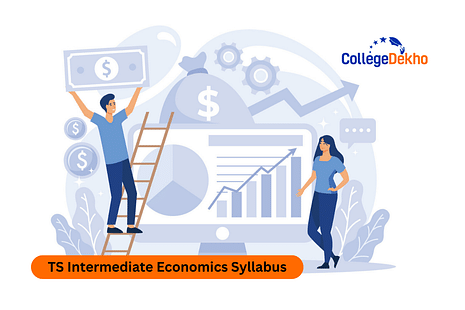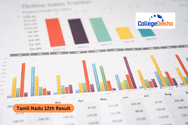

Never Miss an Exam Update
TS Intermediate Economics Syllabus 2025:
Telangana State Board of Intermediate Education has released the Economics syllabus at tsbie.cgg.gov.in. A total of 10 units are mentioned in the syllabus and the detailed list of chapters is also provided in the syllabus PDF. While preparing for the exam, students should check every topic as per the difficulty level of the syllabus and can start their preparation. Students can also segregate the topics as per the weightage of marks. TS Intermediate Economics exam will be conducted for 100 marks.
Moreover, the Telangana State Board of Intermediate Education (TSBIE) has released the
TS Intermediate Time Table 2025
on December 16, 2025. Students can go through the TS Intermediate Syllabus 2025 on the official website, tsbie.cgg.gov.in. Students need to score a qualifying mark in the
TS Intermediate exams
in each subject to get passed which needs to be completed in 3 hours duration. The total number of units covered in the Telangana Intermediate 2nd Year Economics syllabus is 10. To learn more about the TS Intermediate Economics Syllabus 2025, read the entire article and then download the syllabus from the link provided at the end.
Also Read:
TS Intermediate Syllabus for 2nd year Economics
TS Inter syllabus for Economics 2nd year includes topics like Economic Growth and Economic Development, Population and Human Resource Development, National Income, Poverty and Unemployment, Planning and Environment, Agricultural Sector, Industrial Sector, etc. Find below the TS Intermediate 2nd year Economics syllabus for the academic year 2025.Unit | Unit Name |
|---|---|
I. Economic Growth and Economic Development | Introduction |
Concepts of Economic Growth and Economic Development | |
Objectives of Economic Development | |
Indicators of Economic Development (Except 1.3.4, 1.3.6, 1.3.7 ) | |
Factors Hindering Economic Development | |
Factors Promoting Economic Development | |
Characteristics of Developing Economies with Special Reference to India | |
II. Population and Human Resource Development | Introduction |
Theory of Demographic Transition | |
Demographic Features of the Indian Population | |
Concept of Population Explosion: Causes for the rapid growth of population in India | |
Occupational Distribution of Population in India | |
Human Resource Development: Concept and Importance | |
Role of Education in Economic Development and Education in India | |
Role of Health in Economic Development and Health in India | |
Human Development Index (Except 2.9.1 & 2.9.2) | |
Views of Amartya Sen on Human Development | |
III. National Income, Poverty, and Unemployment | Introduction |
A Backdrop to National Income Studies | |
trends in National Income and Per Capita Income in India | |
Sectoral Contribution to National Income | |
Inequalities in the distribution of income and wealth Causes Remedial Measures | |
Poverty in India: Concept, Incidence, Causes and Consequences | |
Unemployment in India: Concepts, Types, Concepts, Causes and Consequences and Redial Measures | |
Poverty elevation and employment generation programs in India | |
IV. Planning and Environment | Introduction |
Part-A: Planning | |
Concept, Importance of Planning (except 4.1.2) | |
Major Objectives of Five-Year Plans in India | |
Review of Five-Year Plans | |
NITI Aayog | |
Part –B: Environment | |
Concept of environment-Importance of the Environment in Economic Development (Except:4.7.2) | |
Concepts of Eco-System, Pollution, and Environmental Degradation, Except 4.8.3(II) | |
Need for environmental protection | |
Sustainable Development | |
V. Agricultural Sector | Introduction |
Importance and Growth of Agriculture in the Indian Economics | |
Causes for Low Productivity in Agriculture and Measures to Improve Agricultural Productivity in India | |
Land Reforms in India | |
Green Revolution in India and its Impact on Indian Economics 137 5.5 Agricultural Credit and Rural Indebtedness (Except 5.5.2) | |
VI. Industrial Sector | Industrial Sector - Introduction |
Structure of Indian Industry | |
Growth and Pattern of Industrial Development in India (Except 6.2.5) | |
Industrial Backwardness | |
Industrial Policy Resolutions (Except 6.4.3, 6.4.4 ) | |
Special Economic Zones (SEZ) | |
Small Scale Industries' role, problems, and issues of sickness | |
Industrial Finance (Except 6.11.1 (G) | |
VII. Tertiary Sector | Introduction |
Tertiary Sector in India: Components and importance 7.2 Infrastructure development in India | |
Transport Sector in India | |
Energy Sector | |
Communications | |
Information Technology | |
Science and Technology | |
Insurance | |
VIII. New Economic Reforms and Foreign Sector | Introduction |
New Economic reforms | |
Liberalization | |
Privatization and Disinvestment | |
Globalization | |
Foreign Direct Investment (FDI) | |
Impact of Economic Reforms on the Indian Economics | |
Balance of Payments and Balance of Trade with special reference to India | |
Role of International Trade in the Indian Economics | |
IX. Economic Features of Telangana | Introduction |
Structure of Telangana State | |
Economic features of Telangana: Sectors SGDP and PCI 9.3 Demographic Features of Telangana | |
Poverty and Unemployment in Telangana | |
Welfare Programmes in Telangana | |
X. Structural Transformation of Telangana Economics | Introduction |
Sectoral Growth in Telangana Economics | |
Infrastructural Development in Telangana: Energy, Irrigation and Transport | |
Communication and Information Technology | |
Banking and Insurance | |
Tourism Sector | |
Environment | |
Regional imbalances in Telangana in comparison to AP | |
Rural and Urban Disparities |
How to Download TS Inter 2nd Year Economics Syllabus 2025?
As students are required to start their preparations for the upcoming examinations, firstly, the syllabus would be the most important thing to know about. Applicants can download the TS intermediate 2nd year Economics syllabus 2025 by following the provided instructions below.- Step 1: Visit the official website of the TS board.
- Step 2: Select the "Syllabus" option from the left menu on the home page.
- Step 3: Choose the Economics subject and click on it.
- Step 4: This will open the PDF file on a new tab.
- Step 5: Save it for further reference.
TS Intermediate Economics 2nd Year Syllabus- Download PDF
The TS Intermediate Economics syllabus is extensive and rigorous. It covers a wide range of topics, from the fundamentals to the advanced, and it contains a substantial practical component that allows students to apply their theoretical knowledge in real-world circumstances. Check here the TS Intermediate Economics syllabus 2025 PDFWas this article helpful?

























